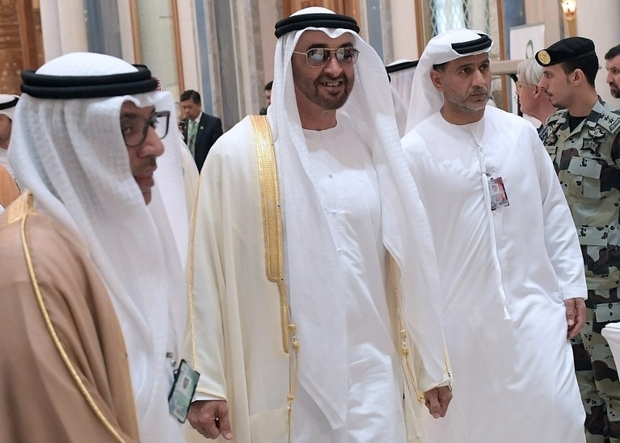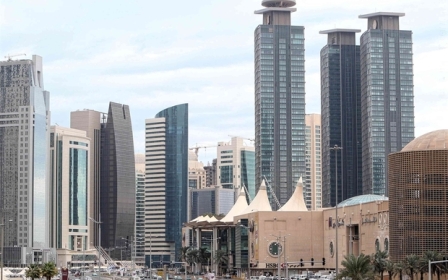Israel, Saudi and UAE suggested Trump-Putin deal: Report

Emirati, Israeli and Saudi officials separately suggested a diplomatic deal to Donald Trump where Russia would curb Iranian influence in Syria in exchange for lifting Ukraine-related sanctions, the New Yorker magazine reported on Tuesday, citing current and former US officials.
Floating the deal happened in conversations before Trump's election in 2016, during the transition and after his inauguration, according to the report. They may be of interest to special counsel Robert Mueller who is investigating foreign influence on US elections and possible collusion between the Trump campaign and Russia.
The UAE's powerful Crown Prince Mohammed bin Zayed made the suggestion before the elections to a "longtime American interlocutor," the magazine reported.
Between the election and Trump's inauguration, Israel's ambassador to the US Ron Dermer also proposed that the new administration work closely with Moscow to persuade Russian President Vladimir Putin to "push the Iranians to leave" Syria, according to the report.
Israel has made Iranian military presence in Syria a top priority in its bilateral talks with Russia.
"Our position on Syria is clear," Israeli Prime Minister Benjamin Netanyahu said in May. "We believe that there is no place for any Iranian military presence, anywhere in Syria."
At a private dinner in the United States in March 2017, Saudi foreign minister Adel al-Jubeir and his UAE counterpart Abdullah bin Zayed also recommended a US deal with Russia involving sanctions and Syria, the New Yorker reported.
"Their message was: 'Why don’t we lift the Ukrainian sanctions on Russia in exchange for getting the Russians to push Iran out of Syria,'" the magazine quoted an attendee of the dinner as saying, without revealing his identity.
The UAE's contacts with the Trump campaign have become a target of Mueller's investigation.
In January 2017, Trump confidant Erik Prince met with the CEO of the Russian Direct Investment Fund Kirill Dmitriev, who is close to Putin, at the Seychelles islands. Prince was at the islands at the invitation of the UAE crown prince.
Leaked emails obtained by MEE revealed earlier this month that Trump’s closest advisers were willing to exchange inside information about US government appointments with Yousef al-Otaiba, the Emirati ambassador to Washington.
Correspondence between Otaiba and Tom Barrack, a longstanding friend of Trump and a billionaire fundraiser, revealed that Barrack offered to bring Trump, then a candidate, to meet the Emirati ambassador for coffee in April 2016.
It also showed how the Republican platform for 2016 was altered to remove a call for the publication of 28 pages of allegedly incriminating documents from the 9/11 inquiry; and how Otaiba sought information about top appointments from Barrack while Trump was president-elect.
The pages were eventually published days before the GOP platform was released.
Meanwhile, Trump's former national security adviser Michael Flynn has reportedly joined a Washington firm that lobbies for Qatar. Flynn was forced out of the administration in February 2017 for failing to disclose that he discussed sanctions in a phone conversation with Russia's ambassador to the US while Barack Obama was still president.
Last year, the UAE and Saudi Arabia imposed sanctions on Qatar, accusing it of financing militants and being close to Iran, accusations that Doha denies.
Both Qatar and the Saudi-led bloc are vying for influence in Washington.
Flynn, who pleaded guilty to lying to the FBI and is said to be cooperating with the Mueller investigation, had done lobbying work for Turkey before the 2016 elections.
He will now be director of global strategy at Stonington Global LLC, which lobbies for Doha.
"The general's uniquely American story and his commitment to national security, freedom and counter-terrorism are an inspiration to millions of Americans, and we are excited to work with him to promote these values around the world," said company founder Nick Muzin.
However, the ex-general denied that he joined the company, calling the statement a "misunderstanding".
New MEE newsletter: Jerusalem Dispatch
Sign up to get the latest insights and analysis on Israel-Palestine, alongside Turkey Unpacked and other MEE newsletters
Middle East Eye delivers independent and unrivalled coverage and analysis of the Middle East, North Africa and beyond. To learn more about republishing this content and the associated fees, please fill out this form. More about MEE can be found here.




